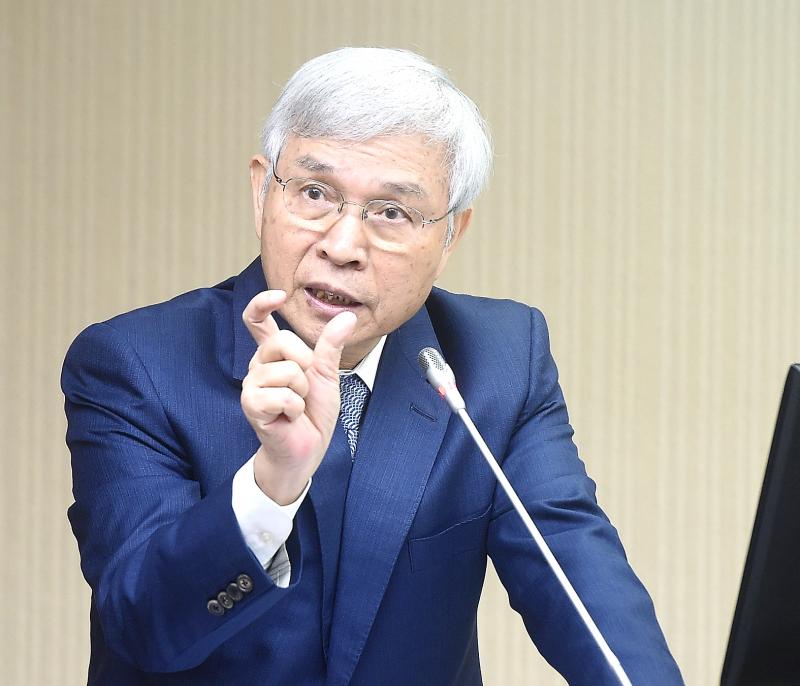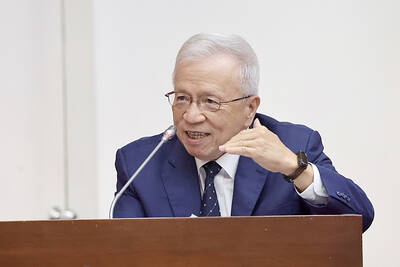The New Taiwan dollar might trade above the NT$29 level against the greenback in the next six to 12 months, central bank Governor Yang Chin-long (楊金龍) said yesterday at a meeting of the legislature’s Finance Committee.
Asked by lawmakers whether the NT dollar’s fast appreciation would erode exporters’ profitability, Yang said that strong exports would bolster current-account surpluses and demand for the local currency.
“It might become the new normal for the NT dollar to trade above the NT$29 notch against the greenback given Taiwan’s strong exports and the weakening US currency,” Yang said, but declined to comment on potential developments beyond the six-to-twelve-month time frame, saying it would be risky and inappropriate.

Photo: Chien Jung-feng, Taipei Times
The NT dollar rose 1.38 percent against the US dollar last month.
So far this month, the NT dollar has advanced another 0.57 percent, closing at NT$28.96 yesterday in Taipei trading.
A strong NT dollar is unfavorable for exporters, especially for firms with thin profit margins, Yang said, adding that the Ministry of Economic Affairs is also concerned about the issue.
However, Yang said that the market has the final say on a currency’s value and the central bank would only step in when spotting irregular activity to slow the pace of change.
Non-technology sectors are taking a hard hit from the NT dollar’s appreciation, while high-tech firms emerge unscathed, Yang said.
Gross margin at smartphone camera lens maker Largan Precision Co (大立光) stood at 65.68 percent last quarter and 53.4 percent at contract chipmaker Taiwan Semiconductor Manufacturing Co (台積電).
Yang refused to guess whether the NT dollar would climb above his predecessor Perng Fai-nan’s (彭淮南) defense threshold, reportedly at NT$28.5.
He said that the central bank does not have a defense in mind and the floated figure is purely a fabrication.
The central bank maintains the policy of “leaning against the wind” — or working against unfavorable economic trends — in dealing with its assets and policy tools, Yang said.
Yang also dismissed media reports that the central bank plans to tighten credit controls to rein in housing price hikes.
Central bank Deputy Governor Chen Nan-kuang (陳南光) earlier this month wrote in The Taiwan Banker magazine that the central bank should put macro-prudential policies in place before expectations of property price increases take hold.
Yang said that he recently called lenders to discuss the concerns, but added that credit controls would run against the global trend of supporting the economy amid the COVID-19 pandemic.
The central bank would continue to closely monitor the property market, he said.

JITTERS: Nexperia has a 20 percent market share for chips powering simpler features such as window controls, and changing supply chains could take years European carmakers are looking into ways to scratch components made with parts from China, spooked by deepening geopolitical spats playing out through chipmaker Nexperia BV and Beijing’s export controls on rare earths. To protect operations from trade ructions, several automakers are pushing major suppliers to find permanent alternatives to Chinese semiconductors, people familiar with the matter said. The industry is considering broader changes to its supply chain to adapt to shifting geopolitics, Europe’s main suppliers lobby CLEPA head Matthias Zink said. “We had some indications already — questions like: ‘How can you supply me without this dependency on China?’” Zink, who also

At least US$50 million for the freedom of an Emirati sheikh: That is the king’s ransom paid two weeks ago to militants linked to al-Qaeda who are pushing to topple the Malian government and impose Islamic law. Alongside a crippling fuel blockade, the Group for the Support of Islam and Muslims (JNIM) has made kidnapping wealthy foreigners for a ransom a pillar of its strategy of “economic jihad.” Its goal: Oust the junta, which has struggled to contain Mali’s decade-long insurgency since taking power following back-to-back coups in 2020 and 2021, by scaring away investors and paralyzing the west African country’s economy.

BUST FEARS: While a KMT legislator asked if an AI bubble could affect Taiwan, the DGBAS minister said the sector appears on track to continue growing The local property market has cooled down moderately following a series of credit control measures designed to contain speculation, the central bank said yesterday, while remaining tight-lipped about potential rule relaxations. Lawmakers in a meeting of the legislature’s Finance Committee voiced concerns to central bank officials that the credit control measures have adversely affected the government’s tax income and small and medium-sized property developers, with limited positive effects. Housing prices have been climbing since 2016, even when the central bank imposed its first set of control measures in 2020, Chinese Nationalist Party (KMT) Legislator Lo Ting-wei (羅廷瑋) said. “Since the second half of

Taiwan Semiconductor Manufacturing Co (TSMC, 台積電) received about NT$147 billion (US$4.71 billion) in subsidies from the US, Japanese, German and Chinese governments over the past two years for its global expansion. Financial data compiled by the world’s largest contract chipmaker showed the company secured NT$4.77 billion in subsidies from the governments in the third quarter, bringing the total for the first three quarters of the year to about NT$71.9 billion. Along with the NT$75.16 billion in financial aid TSMC received last year, the chipmaker obtained NT$147 billion in subsidies in almost two years, the data showed. The subsidies received by its subsidiaries —